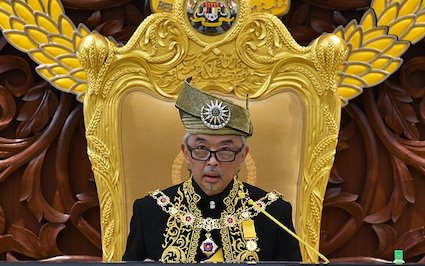The Agong’s statement is only political, not legal

The statement issued by His Majesty the Agong calling for the convening of Parliament has no legal binding effect. It is, at best, a statement which has political impact and may provide guidance to the thinking of His Majesty the Agong.
NO HOLDS BARRED
Raja Petra Kamarudin
Pakatan Harapan is giving the impression that Prime Minister Muhyiddin Yassin is now “trapped” because Seri Paduka Baginda Yang di-Pertuan Agong has decreed (titah) that the Emergency must end, and that Parliament must be reconvened immediately.
Of course, this is also to create the impression that Pakatan Harapan “won” and Perikatan Nasional “lost” and that His Majesty the Agong and His Majesty’s brother-rulers in the Conference of Rulers are with the opposition and not with the government.
This is merely a perception game that Anwar Ibrahim and the opposition people love to play — the same with the perception game he played in September 2020 about him having “the numbers” with a “strong, formidable, convincing majority” to form the government (READ HERE).
Anyway, the political narrative from Pakatan Harapan is not important. That is merely perception creation. They will always spin and try to create the false impression to suit their political agenda. What matters is the legality of the whole thing and what is and is not true.
I do not wish to write a 20-page essay on the matter, which I can. I will just list down the salient points to the whole matter, which addresses only the legal ramifications of His Majesty the Agong’s announcement and not the political implications, which in this case is not relevant since the Agong is not a politician.
1. The Prime Minister has the exclusive power to seek a proclamation of emergency, to summon, or seek a dissolution of Parliament. His Majesty the Agong only has the personal discretion to refuse a dissolution of Parliament.
2. His Majesty the Agong, in exercising His Majesty’s functions under the Constitution, is required and bound to follow the advice of the Prime Minister or the Cabinet or any person or body of persons identified by Federal law.
3. As a matter of law, His Majesty the Agong does not have the power to unilaterally or at his own discretion:
a) Cancel the proclamation of an emergency before 1st August 2021;
b) Summon Parliament; or
c) Dissolve Parliament;
d) Refuse to extend the proclamation of Emergency if advised to do so by the Special Committee; or
e) Refuse to proclaim a further Emergency if advised by the Prime Minister and the Cabinet.
4. The statement issued by His Majesty the Agong calling for the convening of Parliament has no legal binding effect. It is, at best, a statement which has political impact and may provide guidance to the thinking of His Majesty the Agong.
5. As far as enforceability is concerned:
a) The statement of His Majesty the Agong is not enforceable at the instance of the general public or non-government organisations;
b) On the face of it and constitutionally, any advice or action taken under the Emergency provisions are prima facie not reviewable by the Court.
6. The Emergency can only be:
a) Terminated by the natural passage of time;
b) Extended or shortened on the advice of the Special Committee;
c) Annulled by resolution of both houses of Parliament if it is summoned;
d) The power to summon Parliament rests with the Prime Minister and no one else. It is not a justiciable power amenable to judicial review.
7. As a matter of interpretation, His Majesty the Agong’s statement is vague and open to interpretation.
So there you have it. Would any so-called “constitutional lawyer” like to rebut me and argue otherwise?

